
Simone Adams is head of the Department of Media Didactics at the Centre for Digital Teaching and Learning at Karl Franzens University Graz. There she is responsible, among other things, for an e-tutor training for students and the media didactic support of teachers in the first "blended learning bachelor" of the University of Graz at the Faculty of Theology. Her work focuses on the use of digital teaching/learning technologies in university teaching, the didactically motivated use of learning management platforms, digital accessibility and Open Educational Resources. As a doctor of American studies and cultural and communication studies, she has also been teaching and researching topics related to diversity and intersectionality in Europe and the USA for years.
Andreas Bollin studied telematics at the Graz University of Technology and earned his doctorate in applied computer science in Klagenfurt, where he also habilitated in 2012. Since 2002, he has researched and worked on many projects on the topic of new media in teaching, simulation games and informatic thinking. He currently heads the Institute for Computer Science Didactics at the Faculty of Technology at the University of Klagenfurt. His main research interests are: Serious Games, Informatic Thinking, Programming Learning, Competence and Maturity Models in Teaching and Gender- and Personality-optimised Teaching.
Martin Ebner teaches and researches as a habilitated educational computer scientist on topics related to technology-supported teaching and learning, often referred to as e-learning for short. Here he is particularly concerned with mobile learning, the effects of social media and learning analytics, and is considered a great advocate of Open Educational Resources. In addition to his involvement in national and international committees, he is also very committed to the school and university system in Austria. In line with his motto ("making education accessible"), he is one of the founding fathers of the iMooX platform. Besides this project, he is known in the German-speaking world for his textbook L3T, which was the first freely accessible of its kind.
LV-Leadership:
- Styrian University of Teacher Education: Martin Teufel, Gerald Geier, Harald Burgsteiner, Juliane Braunstein
- Private University College of Teacher Education Augustinum: Angela Schlager, Heinz Finster, Peter Kandlbauer, Herbert Stiegler
- Graz University of Technology: Martin Ebner
- University of Graz: Michael Fasching
- University of Klagenfurt: Andreas Bollin, Markus Wieser, Stefan Pasterk
- Carinthian University of Education: Peter Harrich, Nora Ulbing
- Private University College of Teacher Education Burgenland: Elvira Mihalits-Hanbauer
- University College of Teacher Education Upper Austria: Elke Hackl
- Private University College of Education of the Diocese of Linz: Thomas Schöftner, Petra Traxler
- Johannes Kepler University Linz: Sonja Lenz
As the title suggests, this MOOC deals with the use of digital media in both teaching and learning. It is primarily a first introduction to this large complex of topics and is intended to help students acquire the appropriate media skills for their own teaching.
In addition to definitions and explanations, practical examples are shown and tips and tricks for everyday teaching are given, so that the first own use should be possible afterwards.
For the time being, the content is aimed specifically at teacher training students of all subjects, but of course also at teachers in the profession as well as all interested persons who want to learn more about the possible uses of digital media.
After
completing this MOOC you will:
- have basic knowledge of media informatics, media didactics and specific legal frameworks and be able to explain them.
- know a variety of examples from practice, which you can adapt and apply to your respective situations.
Detailed
learning objectives for each unit can be found in the individual module
descriptions.
None.
The course comprises a total of six modules on the following topics, which are interlinked and interrelated:
- Fundamentals of media informatics
- Fundamentals of Media Didactics
- Basics in Computational Thinking / Informatic Thinking
- Legal framework for the use of digital media in the classroom
- Use and impact of digital media in everyday school life
For active participation in the course, an automated confirmation of participation is issued upon completion, which includes your user name, the course name, the course duration and the effort involved. Please note that this is only a confirmation that the user has answered at least 75% of the self-assessment questions correctly.
This work is licensed under a {licenselink}







Assoziierte Partner



ECTS
NOTE: The MOOC is of course public and freely accessible, but in addition this MOOC is part of the course "Lehren und Lernen mit digitalen Medien I" in the curriculum for Sekundarstufe Allgemeinbildung im Entwicklungsverbund Süd-Ost. For this, it is necessary that you are a student in the development alliance and register for the respective course there. Parallel to the MOOC, there will be accompanying exercises in the context of practice groups. Below you will find the respective courses for registration at the locations:
| Place |
Link to the course registration |
|---|---|
| College of Education Styria |
Lehren und Lernen mit digitalen Medien I (Primar) (SS22) Lehren und Lernen mit digitalen Medien I (Sek AB) (SS22) |
| PPH Augustinum |
Lehren und Lernen mit digitalen Medien I (SS21) |
| Graz
University of Technology |
Lehren und Lernen mit digitalen Medien I (SS22) |
| University of Graz |
Lehren und Lernen mit digitalen Medien I (WS22/23) Lehren und Lernen mit digitalen Medien I (SS23) |
| University of Klagenfurt |
Lehren und Lernen mit digitalen Medien I (SS22) Lehren und Lernen mit digitalen Medien I (SS22) |
| Pedagogical
College Carinthia |
Lehren und Lernen mit digitalen Medien I (SS22) |
| PPH
Burgenland |
Lehren und Lernen mit digitalen Medien I (SS22) |
| University
of Education Upper Austria |
Digitale Grundbildung (WS21) |
| Private
University College of Education, Diocese of Linz |
Digitale Grundbildung (WS22) |
| Johannes
Kepler University Linz |
Digitale Grundbildung (SS22) |
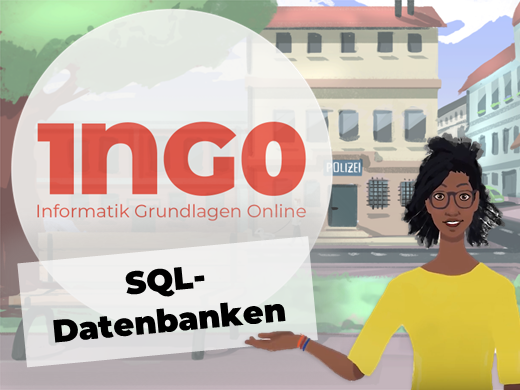
The main authors are Claudia Steinberger and Nina Lobnig, who were actively supported by their colleagues.
We recommend completing the MOOC "Designing a Database: Starting from an Idea to a Relational Data Model" in advance to gain a deeper understanding of the content covered in the course. Nevertheless, the course is designed to be stand-alone and can also be completed without prior knowledge.
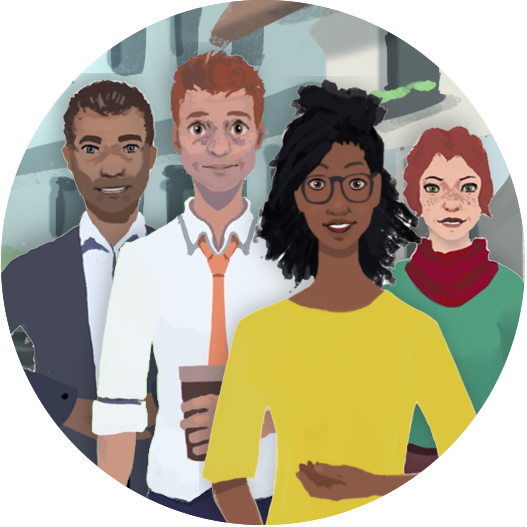
Sam Winter, Peter Rede, Lara Fischer and Amar Kovač
Our fictional characters Sam Winter, Peter Rede, Lara Fischer, and Amar Kovač, will guide you through the course, presenting the content both in theory and in practice as well as illustrating it with examples.
Sam Winter (pictured in the middle) is an expert in databases and introduces the various topics, explains all the essential details, and also demonstrates the content using examples. She often brings examples from her favorite bakery, which she supports in the implementation of a new database, as well as from the police department, with whom she also cooperates.
Peter Rede (mid-left in the picture) is also an expert in databases, especially in the area of mathematical fundamentals and several query languages. In the course, he is particularly involved in relational algebra as well as tuple and domain calculus.
Contributors to the conception and production of the MOOC and its content (all coming from the University of Klagenfurt, listed alphabetically):
- Nicole Burgstaller
- Nina Lobnig
- Michael Morak
- Claudia Steinberger
- Claudia van der Rijst
- Anna-Sophie Wallner
- Aron Wedam
- Markus Wieser
- Andreas Bollin (didactic consulation)
The characters, backgrounds and objects were specially drawn and animated. The people involved in this:
- Jan Jancik (consulting, rigging, intro and outro)
- Stefan Pesendorfer (consulting as well as drawings)
- Wolfgang Neipl
- Nessa Heschmat
Questions or comments?
Feel free to engage in the course forum or send us an email at: 1ng0@aau.at
(Attention: The mail address contains two numbers).
In this course, you'll find all kinds of stuff about working with SQL databases - from a brief introduction to relational databases (what and why?) to mathematical basics (like Relational Algebra) to the more prominent topic of SQL. We take a closer look at how an SQL database is created and how to write queries for retrieving stored data from it. Learning how to write multiple SQL queries forms the central part of this course.
Dive into the world of databases, and learn content through stories! Animated characters explain the content and its use in concrete problem situations and take place in a police department and a local bakery and are always database-related. The contents cover the implementation and operation of an SQL database (as parts of the life cycle of a database), starting from an already existing design (being a relational model). The criminal case database is used frequently, e. g. by the two police inspectors to solve criminal cases, do administrative work, and much more.
The idea behind this course is to move away from a typical teaching setting with recorded lectures towards active learning. Videos are therefore underpinned with H5P elements to increase interactivity and strengthen knowledge straight away. The associated tasks are also designed in an exciting way and embedded in stories. Help our two inspectors to apply what you have learned and show what you can do!
Our content, such as videos, interactive books, PDFs, and more, is designed for everyone: pupils, students, and anyone else who is interested.
Additional note:
The tasks for SQL queries are also included in aDBenture (adbenture.aau.at) and can directly be played there; the link is attached to the respective tasks. However, the tasks can also be solved with a local database instance. We work with the standardized SQL commands as they are usable in several database management systems; in cases where this was not well possible, we use the syntax of PostgreSQL.
What can you expect in the course? What content will be covered?
You can get a brief overview in the video above.
Structure of the course:
The MOOC is divided into several lessons - that's nine informative steps into the world of relational databases, focussing on SQL:
Lesson 1: Overview of the MOOC's goals, content, and working methods
Lesson 2: Introduction to the world of databases and SQL
Lesson 3: Relational Algebra as a theoretical foundation
Lesson 4: Creating an SQL database
Lesson 5: Simple SQL queries
Lesson 6: Working with different datatypes (numbers, strings, dates)
Lesson 7: SQL queries across multiple tables (joins)
Lesson 8: Groups and aggregate functions in SQL queries
Lesson 9: Queries in queries (simple and correlated subqueries)
Note: The above learning time per lesson is estimated, and results if all topics and in-depth examples (tasks) are worked through entirely in the lessons. With appropriate prior knowledge, this can be significantly shortened. It is also possible to only take single lessons or single content. In this case, however, no certificate can be provided.
- Know essential terms related to relational databases
- Know the properties of SQL, its command categories, and the advantage of standardisation
- Understand expressions in Relational Algebra and read and formulate simple queries
- Understand and apply logic in context (linking statements with AND, OR, NOT, etc.)
- Set up a database on a relational database system (with SQL)
- Query information from individual tables with SQL
- Dealing with different types of data in SQL queries
- Query information by joining multiple tables
- Group data and use aggregate functions (e. g. to calculate max, min, average)
- Create simple and correlated subqueries
No special prior knowledge is required for this course. This excludes ordinary computer skills, as well as related software (including downloading and installing software) and using web applications.
Each lesson starts by outlining the key content that will be covered in the lesson and questions that can be answered after the lesson is complete. If we suggest an exercise environment in a lesson, there is also detailed information about it before things get started. Depending on the scope, a lesson consists of one or more topics.
In this MOOC, we follow a particularly applied learning approach (with a fictional police department and bakery). Therefore, topics usually start with a practical question, which is intended as a challenge and should be able to be solved after working through the topic. If the necessary competencies are already available due to previous experience, this will become clear already at this point.
For each topic, we offer learning objects that convey basic knowledge about a topic (what I should know about the topic) or show the application of this basic knowledge by means of examples (application examples) and also tasks for applying what has been learned. These can be short videos (with characters from our police department), interactive books, or texts. The order of the learning objects is technically sequential but can be consumed as needed.
Each lesson concludes with a lesson quiz. 75% of the required points are necessary for the positive completion of the lesson (and the certificate at the end).
For actively participating in the course you will receive an automatic certificate which includes your username, the course name as well as the completed lessons. We want to point out that this certificate merely confirms that the user answered at least 75% of the self-assessment questions correctly.
This work is licensed under {licenselink} University of Klagenfurt.
 bmbwf
bmbwf
Dieser MOOC wurde vom bmbwf im Rahmen des Projektes eInformatics@Austria(Digitale und Soziale Transformation in der Hochschulbildung, 2020-2024) gefördert. Ziel des Projektes ist die Entwicklung von MOOCS zur Vermittlung von Informatik Grundlagen Online (1ngO) und dieser Kurs deckt einen Teil des Themas 'Datenbanken' ab.
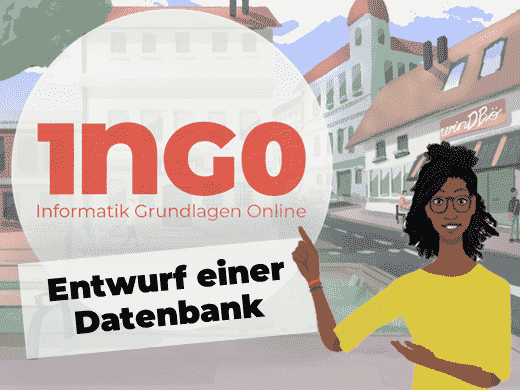
The main authors are Claudia Steinberger and Nina Lobnig, who were actively supported by their colleagues.
It is recommended to complete the MOOC on 'Databases: Discover the World of SQL' afterwards as it is designed as a follow-up course.
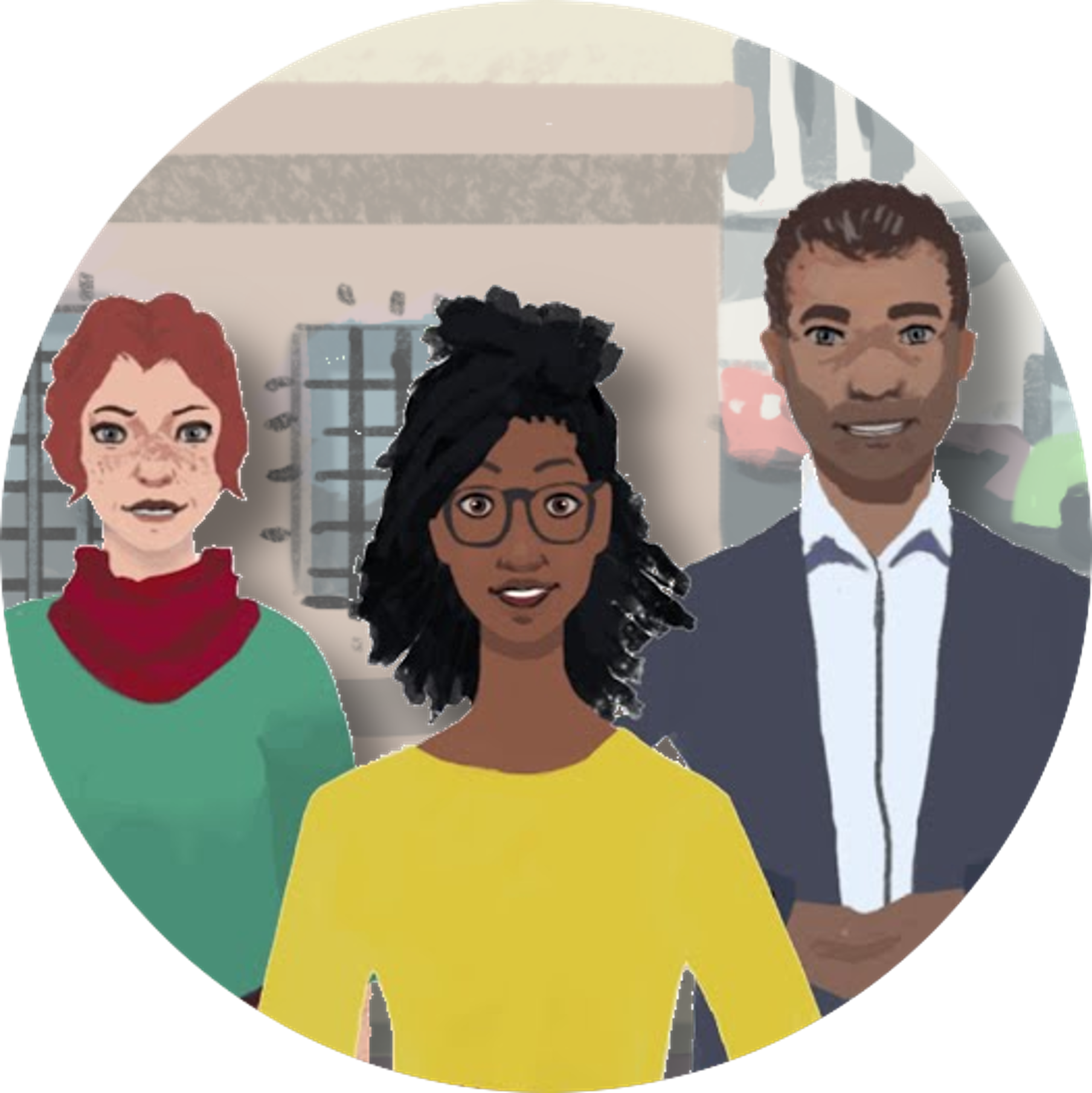
Sam Winter, Lara Fischer and Amar Kovač
Our fictional characters Sam Winter, Lara Fischer and Amar Kovač will guide you through the course, presenting the content both in theory and in practice as well as illustrating it with examples.
Sam Winter (pictured in the middle) is an expert in databases and introduces the various topics, explains all the important details and also demonstrates the content using examples. She often brings examples from her favorite bakery, which she supports in the implementation of a new database, as well as from the police department, with whom she also cooperates.
Lara Fischer (on the left) and Amar Kovač (on the right) are two police officers who exchange ideas with expert Sam. They apply the introduced knowledge in their daily work.
Contributors to the conception and production of the MOOC and its content (all coming from the University of Klagenfurt, listed alphabetically):
- Nicole Burgstaller
- Nina Lobnig
- Michael Morak
- Claudia Steinberger
- Claudia van der Rijst
- Anna-Sophie Wallner
- Aron Wedam
- Markus Wieser
- Andreas Bollin (didactic consulation)
The characters, backgrounds and objects were specially drawn and animated. The people involved in this:
- Jan Jancik (consulting, rigging, intro and outro)
- Stefan Pesendorfer (consulting as well as drawings)
- Wolfgang Neipl
- Nessa Heschmat
Questions or comments?
Feel free to engage in the course forum or send us an email at: 1ng0@aau.at
(Attention: The mail address contains two numbers).
In this course, you'll find all kinds of stuff about databases - from modeling with UML to relation schemas and the quality of relational schemas and corresponding anomalies. Our content, such as videos, interactive books, PDFs, and more, is designed for everyone: pupils, students, and anyone else who is interested.
Dive into the world of databases, and learn content through stories! Animated characters explain the content and its use in concrete problem situations and take place in a police department and a local bakery and are always database-related. The contents span the entire design of a criminal and a bakery database and thus represent an essential part of the life cycle of a database. A good design lays the foundation for valuable and practicable databases and prevents problems!
The conceptual and logical design steps of this database are accompanied and attention is drawn to problems and anomalies of poorly designed databases and what determines good relational design. The idea behind this course is to get away from a typical teaching setting with recorded lectures towards more active learning and application of the taught knowledge. Videos are therefore underlaid with H5P elements to increase interactivity and consolidate knowledge right away. The associated tasks are also designed in an exciting way and embedded in stories. Help our two inspectors apply what you've already heard and show what you've got!
What can you expect in the course? What content will be covered?
You can get a brief overview in the video above.
Structure of the course:
The MOOC is divided into several lessons - that's six informative steps into the world of relational databases:
Lesson 1: Overview of the MOOC's goals, content, and working methods
Lesson 2: Introduction to the world of databases
Lesson 3: Domain analysis and conceptual design (semantic data model)
Lesson 4: Extended conceptual design
Lesson 5: Design of a relational database (transformation to the relational model)
Lesson 6: Quality of relational schemas and normal forms
Note: The above learning time per lesson is estimated, and results if all topics and in-depth examples (tasks) are worked through entirely in the lessons. With appropriate prior knowledge, this can be significantly shortened. It is also possible to only take single lessons or single content). In this case, however, no certificate can be provided.
- Know the characteristics, architecture and data models of database systems.
- List phases of database development and briefly describe the necessary steps
- Design a database conceptually (using UML class diagrams)
- Derive a relation model from the database design
- Name guidelines for well designed relational schemas and briefly describe and fix anomalies occurring in non-normalized schemas
- Being familiar with the first three normal forms and being able to determine the normal form of a given scheme
No special prior knowledge is required for this course. This excludes ordinary computer skills, as well as related software (including downloading and installing software) and using web applications.
Each lesson starts by outlining the key content that will be covered in the lesson and questions that can be answered after the lesson is complete. If we suggest an exercise environment in a lesson, there is also detailed information about it before things get started. Depending on the scope, a lesson consists of one or more topics.
In this MOOC, we follow a particularly applied learning approach (with a fictional police department and bakery). Therefore, topics usually start with a practical question, which is intended as a challenge and should be able to be solved after working through the topic. If the necessary competencies are already available due to previous experience, this will become clear already at this point.
For each topic, we offer learning objects that convey basic knowledge about a topic (what I should know about the topic) or show the application of this basic knowledge by means of examples (application examples) and also tasks for applying what has been learned. These can be short videos (with characters from our police department), interactive books, or texts. The order of the learning objects is technically sequential but can be consumed as needed.
Each lesson concludes with a lesson quiz. 75% of the required points are necessary for the positive completion of the lesson (and the certificate at the end).
For actively participating in the course you will receive an automatic certificate which includes your username, the course name as well as the completed lessons. We want to point out that this certificate merely confirms that the user answered at least 75% of the self-assessment questions correctly.
This work is licensed under {licenselink} University of Klagenfurt.
 bmbwf
bmbwf
Dieser MOOC wurde vom bmbwf im Rahmen des Projektes eInformatics@Austria(Digitale und Soziale Transformation in der Hochschulbildung, 2020-2024) gefördert. Ziel des Projektes ist die Entwicklung von MOOCS zur Vermittlung von Informatik Grundlagen Online (1ngO) und dieser Kurs deckt einen Teil des Themas 'Datenbanken' ab.

Simone Adams is head of the Department of Media Didactics at the Centre for Digital Teaching and Learning at Karl Franzens University Graz. There she is responsible, among other things, for an e-tutor training for students and the media didactic support of teachers in the first "blended learning bachelor" of the University of Graz at the Faculty of Theology. Her work focuses on the use of digital teaching/learning technologies in university teaching, the didactically motivated use of learning management platforms, digital accessibility, and Open Educational Resources. As a doctor of American studies and cultural and communication studies, she has also been teaching and researching topics related to diversity and intersectionality in Europe and the USA for years.
Andreas Bollin studied telematics at the Graz University of Technology and earned his doctorate in applied computer science in Klagenfurt, where he also habilitated in 2012. Since 2002, he has researched and worked on many projects on the topic of new media in teaching, simulation games and informatic thinking. He currently heads the Institute for Computer Science Didactics at the Faculty of Technology at the University of Klagenfurt. His main research interests are: Serious Games, Informatic Thinking, Programming Learning, Competence and Maturity Models in Teaching and Gender- and Personality-optimised Teaching.
Martin Ebner teaches and researches as a habilitated educational computer scientist on topics related to technology-supported teaching and learning, often referred to as e-learning for short. Here he is particularly concerned with mobile learning, the effects of social media and learning analytics, and is considered a great advocate of Open Educational Resources. In addition to his involvement in national and international committees, he is also very committed to the school and university system in Austria. In line with his motto ("making education accessible"), he is one of the founding fathers of the iMooX platform. Besides this project, he is known in the German-speaking world for his textbook L3T (http://l3t.eu), which was the first freely accessible of its kind.
Course instructors:
- University of Teacher Education Graz: Harald Michael Burgsteiner, Martin Teufel
- Private University College of Education Augustinum: Clemens Lauermann
- Graz University of Technology: Martin Ebner, Maria Grandl
- University of Klagenfurt: Nina Angela Lobnig
- University of Teacher Education Upper Austria: Elke Hackl
- Private University College of Education of the Diocese of Linz: Thomas Schöftner, Petra Traxler
This MOOC deals with the use of digital media in both teaching and learning and is intended as a consolidation of the topic. The primary aim is to continue the content learned in the course "Educational Technology I" and thus to acquire the corresponding media competences for one's own teaching.
In addition to definitions and explanations, practical examples are shown and tips and tricks for everyday teaching are given so that participants can integrate digital media meaningfully into their everyday teaching and learning.
The contents are aimed specifically at teacher training students of all subjects, but of course also at teachers in the profession as well as all interested persons who want to learn more about the possible uses of digital media for teaching.
After completing this MOOC you will:
have in-depth knowledge of media informatics and media didactics for application in the professional field,
fundamentally understand the informatics way of thinking and
be able to implement technology-based problem solving and know its limitations.
Detailed learning objectives for each unit can be found in the individual module descriptions.
The course is designed as a continuation of the course "Educational Technology I" and therefore it is recommended to have this basic knowledge.
The course comprises a total of six modules on the following topics, which are interlinked and interrelated:
- In-depth knowledge of media informatics in relation to teaching and education.
- In-depth knowledge of media didactics
- In-depth knowledge of Computational Thinking / Informatic Thinking
- In-depth knowledge in the area of media use and effects
For actively participating in the course you will receive an automatic confirmation of participation (certificate) which includes your username, the course title, course duration as well as the hours required to complete the course. We want to point out that this certificate merely confirms that the user answered at least 75% of the self-assessment questions correctly.
This work is licensed under a {licenselink}







Associated Partners


ECTS
NOTE: The MOOC is of course public and freely accessible, but in addition this MOOC is part of the course "Lehren und Lernen mit digitalen Medien I" in the curriculum for Sekundarstufe Allgemeinbildung im Entwicklungsverbund Süd-Ost. For this, it is necessary that you are a student in the development alliance and register for the respective course there. Parallel to the MOOC, there will be accompanying exercises in the context of practice groups. Below you will find the respective courses for registration at the locations:
|
University |
Link to the inscription |
|
College of Education Styria |
Lehren und Lernen mit digitalen Medien II (WS23) |
|
PPH Augustinum |
Lehren und Lernen mit digitalen Medien II (WS23) Lehren und Lernen mit digitalen Medien II (SS24) |
|
Graz University of Technology |
Lehren und Lernen mit digitalen Medien II (WS23) |
|
University of Klagenfurt (Studienrichtung |
Lehren und Lernen mit digitalen Medien II (WS23) |
| University
of Education Upper Austria |
Informations- und Kommunikationtechnologien in der Schule III (SS23) |
| Private
University College of Education, Diocese of Linz |
Digitale Grundbildung (WS23) Digitale Grundbildung (SS24) |
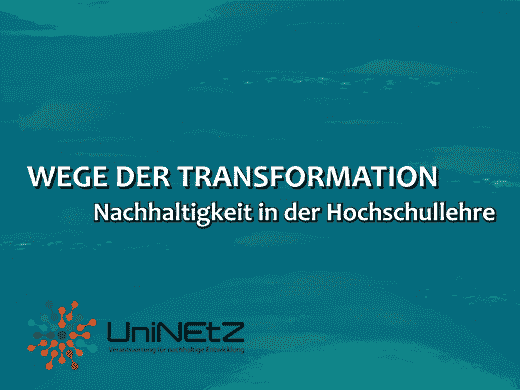
Dieser MOOC ist im Schwerpunktbereich IV des Projekts Universitäten
und Nachhaltige Entwicklungsziele (UniNEtZ) enstanden und wurde von Stefanie Preiml, Dominik Ruffeis (beide Kursleiter:innen), Karin Oberauer und Caroline Weberhofer gestaltet.
Stefanie Preiml arbeitet als Senior Scientist am Institut für Unterrichts- und Schulentwicklung der Universität Klagenfurt. Ihr Aufgaben liegen in der Koordination des UniNEtZ Schwerpunktbereichs 4 "Hochschulübergreifende Lehre" an der Universität Klagenfurt und in der Mitarbeit im Sparkling Science Projekt "Klagenfurt wird klimaneutral". Ihre bisherigen Forschungsinteressen umfassen geographische Systemwissenschaften, die Gestaltung Nachhaltiger Hochschulen sowie Transformatives Lernen.
Dominik Ruffeis arbeitet hauptberuflich als Trainer und Coach in der hochschuldidaktischen Aus- und Weiterbildung an der Technischen Universität Graz (Teaching Academy). Zusätzlich lehrt er an der Universität für Bodenkultur zu Themen der Entwicklungsforschung und des nachhaltigen Managements von natürlichen Ressourcen.
Karin Oberauer arbeitet als Senior Scientist in der Arbeitsgruppe Education and Communication for Sustainable Development am Institut für Fachdidaktik der Universität Innsbruck. Im Rahmen von UniNEtZ beschäftigt sie sich mit SDG 4 Hochwertige Bildung im Kontext von Hochschulen. Durch die Arbeit in der Forschungs-Bildungs-Kooperation k.i.d.Z.21 bringt sie auch die Perspektive der schulischen Bildung mit. Ihre Forschungsinteressen sind: Bildung für Nachhaltige Entwicklung, Mindfulness, Inner Development Goals sowie innovative Lehr- und Lernsettings, die zur Transformation einladen und beitragen.
Caroline Weberhofer ist Senior Lecturer am Institut für Medien- und Kommunikationswissenschaften der Universität Klagenfurt, leitet dort das Medienstudio und ist Mitglied der Studienprogrammleitung. Seit rund 10 Jahren setzt sie sich mit Nachhaltigkeitsthemen in der Lehre auseinander und bringt sie in ihre eigene Lehre intensiv ein.The MOOC “Ways of Transformation - Sustainability in Higher Education” is aimed at university teachers and interested instructional designers who are concerned with the topic of sustainability and would like to give the topic more space in their own teaching. The MooC was developed in the focus area IV of the project Universities and Sustainable Development Goals (UniNEtZ). Stefanie Preiml, Dominik Ruffeis, Karin Oberauer and Caroline Weberhofer are involved in its creation.
In thisMooC, we give you an insight into
- why sustainability is important in higher education,
- which educational concepts on sustainability can be helpful for your own teaching,
- and we work with you to discover potential for sustainability in your own teaching.
You can complete the MOOC from January 2025 onwards!
Once you have completed the MOOC, you will be able to
- assess the high relevance of sustainability for your own teaching,
- identify educational concepts on sustainability and
- identify potentials as well as opportunities for linking them to your own teaching.
The MOOC “Ways of Transformation - Sustainability in Higher Education” includes the following units:
- Introduction to the MooC “Paths of Transformation - Sustainability in Higher Education”
- Why is sustainability important in teaching?
- Didactic foundations and concepts of education for sustainable development
- Bringing sustainability into the clasroom? A look over the shoulders of experts
- Reflection - How do you imagine your teaching in 2040?
Universität Klagenfurt, TU-Graz, Universität Innsbruck, AG BNE der Allianz Nachhaltige Universitäten